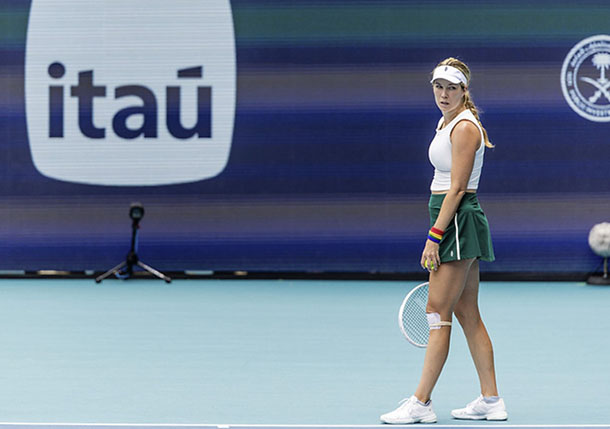
By Chris Oddo | @TheFanChild | Sunday March 31, 2024
On Saturday at the Miami Open, Danielle Collins played with as much clarity as one can imagine, on one of the biggest stages in tennis, as she battled past Elena Rybakina to earn the biggest title of her career.

To any outside observer it looked like there wasn’t a doubt in her mind, but the elated American assured reporters after her 7-5, 6-3 takedown of the 2022 Wimbledon champion that she had her share.
Collins, who became the second lowest-ranked woman to win the title in Miami, and just the sixth woman over the age of 30 to raise the prestigious trophy, didn’t even know if she’d be in good enough shape to play in Miami a few weeks ago.
If you’ve been following her story this season, or over the course of her career, you know that blue skies can quickly go dark on Collins, who suffers from Rheumatoid Arthritis and Endometriosis, inflammatory diseases that have sapped her strength taken her body out of whack on many occasions.
Earlier this month, Collins was having trouble walking, in fact.
“I had a few days, not exaggerating, I literally, like, couldn't walk,” she told reporters on Saturday in Miami. “I was having to have my boyfriend help me a lot. It was awful. There were a lot of tears about, ‘Oh, my gosh, I have played all these tournaments, I have worked so hard for this, and now we're at Indian Wells and Miami and this is happening, like, why?’”
Collins pulled herself together and found a way to get her body right in time to rip through the Miami draw. Now we know why she spent time thanking the tournament physiotherapists during her trophy presentation speech.
“Luckily with the help of the physical therapy and chiropractor we were able to kind of get it under control and make some adjustments too with some of my training and recovery and got it to a place where it was more manageable,” Collins said, adding:
“After Indian Wells I was able to get a couple good days of practice. I felt pretty confident, but the amount of time that I was practicing on court and the type of drills that we were doing, I was [thinking] this is going to be hard, going into Miami. I don't feel like we had a practice where I physically really exerted myself. That made me a little nervous.”
Coming in undercooked, the 30-year-old said she also learned a lesson about problem solving.
“That's the thing that I have learned the most from this tournament is, ‘Okay, it's never going to be 100 percent, and you've got to figure out a way, even though you have those challenges, to work through it and get through it.”
Collins said that her mental preparation also helped her achieve this groundbreaking result. Having a method to control all her emotions on the court has been key.
“I think just staying within myself, a lot of the psychological work that I have done has been kind of centered around breathing and the routines between the points, to kind of get me centered. I feel like this tournament has been the most centered that I have been.
“I know it sounds like a little yoga, hippy-dippy, and I know that's probably really weird with my persona, but I do try to kind of think about that stuff a lot to keep me in check.”